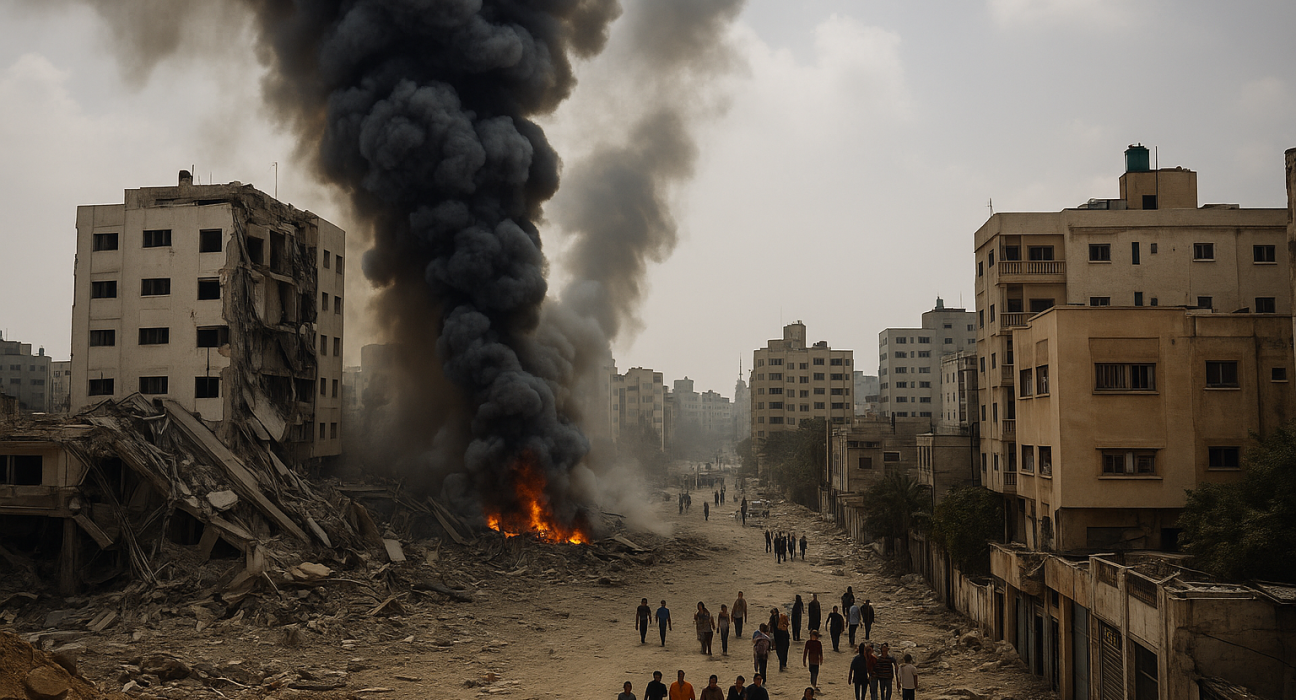- Israeli forces have stepped up airstrikes in Gaza City, destroying at least 30 residential buildings and displacing thousands of Palestinians, according to local (Palestinian) officials. Reuters
- About a million Palestinians are sheltering in Gaza City, which Israeli officials describe as the “last bastion” of Hamas. Israel says one of its goals is to seize control of Gaza City. Reuters+1
- U.S. Secretary of State Marco Rubio has arrived in Israel (on a diplomatic mission) to discuss humanitarian issues, hostage negotiations, and the future reconstruction of Gaza. He is specifically focused on freeing hostages held by Hamas and planning down the road for Gaza’s reconstruction. Reuters+1
- The article mentions a controversial Israeli airstrike in Doha targeting Hamas leaders, which has caused diplomatic tension, especially since it affects Qatar, a country often involved in mediation efforts. Reuters+1
- Humanitarian conditions in Gaza are described as worsening. Agencies such as UNRWA are halting operations in some areas; malnutrition is rising; infrastructure damage is significant. Reuters
- There are evacuation orders for Gaza City; Israel is urging civilians to move southward before further ground operations. Tens of thousands have left, but many remain. Some evacuees express concern about safety and capacity in the designated zones. Reuters+1
Main Points / Highlights
- Escalation of military operations — notably increasing airstrikes in Gaza City, targeting residential buildings and forcing mass displacement.
- Diplomatic overlay — Rubio’s arrival signifies high-level U.S. involvement in mediation, hostage release discussions, and post-conflict planning.
- Humanitarian crisis deepens — worsened by evacuation orders, infrastructure damage, malnutrition, and interruptions in aid operations.
- Regional diplomatic tensions — including Qatar’s frustration over strikes, the potential impact on mediation, and wider responses from Arab/Islamic states.
- Strategic objective of Israel — to take control of Gaza City, which it frames as necessary for neutralizing Hamas, but which carries high civilian risk.
What It Means Going Forward — Projections
Here are some likely developments and implications, based on current facts:
- Increased displacement & humanitarian strain
As airstrikes intensify and evacuation orders continue, more civilians will likely be displaced. Areas designated as “safe zones” may be overwhelmed or lack the infrastructure (water, shelter, food, medical) to support large numbers of people. The risk of humanitarian catastrophe increases. - Diplomatic pressure & international scrutiny
Rubio’s visit could lead to more active U.S. pressure on Israel over civilian protection and aid access. Other countries, international organizations, or UN bodies may increase calls for ceasefires or investigations if civilian casualties grow. - Hostage issue remains central
The status and number of hostages still held by Hamas will likely remain a key issue in negotiations. The success or failure of efforts to free them could influence public sentiment (both in the U.S. and globally), diplomatic leverage, and military decisions. - Risk of escalated conflict
If Israel moves into ground operations in densely populated Gaza City, the scale of conflict, destruction, and casualties could increase dramatically. Resistance from Hamas and spillover concerns (security, regional relations) are possible. - Impact on regional relations and alliances
The hit in Doha and tensions with Qatar raise risk that allies will be more critical or wary of Israeli actions. The Abraham Accords (and similar diplomatic agreements) could be strained by settlement expansion or by actions seen as undermining peace or stability. - Post-war reconstruction & political contest
Planning for reconstruction of Gaza will be complicated. Who pays, who rebuilds, under what governance, and how to ensure safety will be contested. The political narratives in Israel, the U.S., Palestine, and in broader Arab states will shape how reconstruction proceeds. - Potential legal / human rights implications
Continued destruction of residential infrastructure, rising civilian deaths, and displacement may lead to increased scrutiny under international humanitarian law. There may be calls for investigations, reporting, or legal accountability from human rights groups.
